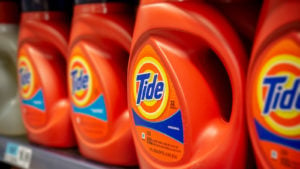With the Federal Reserve seemingly open to the idea of interest rate cuts next year, the narrative for the best Dow Jones stocks for conservative investors appears overly cautious. Don’t get me wrong – you generally can’t go wrong with targeting individual securities under the venerable index. Still, if you’re looking for growth opportunities, the Dow is a bit tame to put it diplomatically.
Nevertheless, you’ve got to ask yourself a question: how sure are you that the Fed will actually lower borrowing costs? After all, the November jobs report came in hotter than expected. Right now, that means more dollars are chasing after fewer goods, which is inflationary. Cutting rates would add to that inflation, which is odd. Therefore, the best Dow Jones stocks for conservative investors are very much relevant.
Second, the Dow represents an elite basket of the best that America has to offer. No, these names aren’t exactly sexy. But they should keep the ship steady in choppy waters. And you know what’s really awesome? Even when companies get kicked out of the index, the booted enterprises tend to perform better than their index-promoted counterparts.
That’s some serious clout. With that, below are the best Dow Jones stocks for conservative investors.
Dow (DOW)

What it is: Based in Midland, Michigan, Dow (NYSE:DOW) is a materials sciences specialist with products covering a wide range of industries.
Relevance: Unless you envision a future where agriculture, consumer goods, electronics, personal care and food and beverage products no longer carry any relevance, you should at the very least consider some exposure to DOW stock. While the underlying enterprise is boring as all heck, it commands a vast influence across countless industries. It may very well be the shotgun approach among the best Dow Jones stocks for conservative investors.
Pros: Basically, if you bet on everything, it’s tough to lose. On the financial front, Dow posts a very strong three-year EBITDA growth rate of 54.8%, beating out 92% of its peers. Also, the company trades at a price/earnings-to-growth (PEG) ratio of 1.24x, below the sector median of 1.73x. Finally, it gets the analysts’ nod with a consensus moderate buy rating.
Cons: When you do bet on everything, your net rewards could be limited. That seems to be the case with the extremely modest analysts’ price target of $55.64.
JPMorgan Chase (JPM)

What it is: Headquartered in New York City, JPMorgan Chase (NYSE:JPM) is a global financial powerhouse.
Relevance: Currently listed as the world’s biggest bank based on market capitalization, JPMorgan Chase commands extraordinary relevance as is. Now, it must be said that the regional banking crisis earlier this year sent jitters across the financial space. However, the consolidation effect that may materialize in the years ahead won’t be of much concern to JPMorgan. It’s one of the top-tier bellwethers, thus ranking it among the best Dow Jones stocks for conservative investors.
Pros: Financially, JPMorgan benefits from slightly better-than-average long-term revenue growth. As well, it’s consistently profitable, providing reassurances for nervous investors. Naturally, the financial stalwart saw an increase in net interest income. However, it significantly improved its non-interest income on a trailing-12-month (TTM) basis relative to 2022 levels.
Cons: JPM incurred a conspicuous loss of market value in 2022 due to spiked borrowing costs. The same situation could materialize if the Fed doesn’t go through with rate cuts.
Coca-Cola (KO)

What it is: Based in Atlanta, Georgia, Coca-Cola (NYSE:KO) is a stalwart in the soft-drink industry. Also, it’s an icon of American capitalism.
Relevance: As a globally recognized consumer brand, it’s difficult to see Coca-Cola ever losing its relevance. Further, if the economy doesn’t chug along as projected, the company could benefit from the trade-down effect; that is, consumers will eschew caffeinated beverages at pricey retail establishments and head to the grocery store. Further, while the soft drink sector is boring, experts project that it will expand at a compound annual growth rate (CAGR) of 4% from this year to 2032.
Pros: I think it’s reasonable to assume that Coca-Cola will capture a big chunk of the projected soft-drink market valuation of $654.37 billion by 2032. Financially, there’s nothing truly remarkable about the company in terms of revenue growth or valuation. However, it’s consistently profitable, rewarding shareholders with a 3.14% dividend yield.
Cons: Since the start of the year, KO dipped about 7%, which is something to consider. Also, the upside potential may be somewhat limited with analysts forecasting a per-share price of $63.88.
Procter & Gamble (PG)

What it is: A mainstay in the consumer goods industry, Procter & Gamble (NYSE:PG) has long been a favorite brand in the U.S. and throughout the world.
Relevance: Obviously, no one – unless they’re speculative on derivative contracts – wagers on P&G to get rich quick. However, if you’re looking for ideas for the best Dow Jones stocks for conservative investors, it doesn’t get more conservative than PG. Fundamentally, the company keeps marching by providing consumers with everyday needs. Unless you envision a future where humans won’t wipe themselves, P&G offers a reasonably safe investment.
Pros: When it comes to PG and its ilk, the core strength centers on business predictability. I don’t know what’s going to happen in the market tomorrow but I can guarantee you that someone will be brushing their teeth. With that, P&G prints a three-year revenue growth rate of 6.9%, just a hair above average. But it’s consistently profitable, allowing shareholders to enjoy an okay (not great) dividend yield of 2.59%.
Cons: By being such a stable example of the best Dow Jones stocks for conservative investors, it lacks flexibility. In football terms, PG is the equivalent of the prevent defense.
Microsoft (MSFT)

What it is: Hailing from Redmond, Washington, Microsoft (NASDAQ:MSFT) is a technology giant offering both hardware and software solutions.
Relevance: As one of the world’s top consumer tech giants, Microsoft is heavily tied to the PC market. For quite some time, industry pundits have called for the death of the format. However, such a draconian forecast may be off. Indeed, Statista shows that while we’re not talking about a growth monster here, the segment should expand at a CAGR of 2.3% between 2023 and 2028. At the forecast culmination, PC market volume could hit $247.1 billion.
Pros: As with some of the top industry leaders, I believe it’s reasonable that Microsoft will dominate the PC market. Further, the business (and academic) world largely runs on Microsoft Windows, leading to software revenue expansion opportunities. Financially, the company enjoys a solid three-year revenue growth rate of 15.1%. It also posted at least 10 years of net income over the past decade.
Cons: While analysts anticipate double-digit growth over the next 12 months, MSFT already jumped 56% year-to-date. Therefore, actual upside could be limited.
Walmart (WMT)

What it is: A behemoth in the big-box retailing sector, Walmart (NYSE:WMT) represents a bellwether for consumer sentiment.
Relevance: While Walmart is perhaps best known for catering to consumer discretionary demand, the reality is that the company represents a one-stop shop. From clothing to electronics to groceries and everything in between, Walmart has it all. In addition, the retailing giant has its pulse on consumer trends. Recently, it expanded its partnership with Affirm (NASDAQ:AFRM) to facilitate buy now, pay later (BNPL) transactions at self-checkout kiosks.
Pros: As a leader in everyday low pricing, Walmart offers relevance no matter what the economic cycle. Regarding its financials, the company posts a three-year revenue growth rate of 7%. That’s noticeably above the 5.1% sector median. Further, it’s been profitable 10 years in the past decade, supporting a modest dividend yield of 1.49%. Analysts also see shares hitting $180.79, projecting over 16% upside potential.
Cons: If the consumer economy weakens, WMT could suffer some volatility. So, while it may be one of the best Dow Jones stocks for conservative investors, you can’t be completely oblivious.
Merck (MRK)

What it is: Headquartered in Rahway, New Jersey, Merck (NYSE:MRK) is a powerhouse in the pharmaceuticals industry.
Relevance: As a pharmaceutical giant, Merck benefits from some degree of economic insulation. When people fall ill with a serious disease or condition, they need to do what it takes to get better. In terms of hard data, the global pharmaceutical manufacturing market reached a valuation of $516.48 billion last year. By 2030, the segment could hit $929.9 billion, representing a CAGR of 7.63%.
Pros: In some ways, Merck benefits from the best of both worlds. While it’s a massive blue chip, the company also sports a three-year revenue growth rate of 15.4%. That’s above 78% of its peers in the drug manufacturing space. Even with its consistently profitable profile, MRK trades at a forward earnings multiple of 12.48x, below the sector median of 14.46x. Thus, it makes a great case for the best Dow Jones stocks for conservative investors.
Cons: The world of pharmaceuticals can be volatile, depending on clinical progress.
On the date of publication, Josh Enomoto did not have (either directly or indirectly) any positions in the securities mentioned in this article. The opinions expressed in this article are those of the writer, subject to the InvestorPlace.com Publishing Guidelines.
